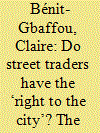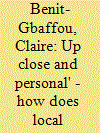|
|
|
Sort Order |
|
|
|
Items / Page
|
|
|
|
|
|
|
| Srl | Item |
| 1 |
ID:
170746


|
|
|
|
|
| Summary/Abstract |
In 2012, a Chinese developer, Zendai, purchased 1,600 hectares of land in Modderfontein, Johannesburg, and announced plans for a new urban megadevelopment. Hiring a Chinese designer, the company released a series of computer-generated images. Drawing on these, the media and many in the city perceived the site to be distinctly “Chinese,” rooted in futuristic, speculative visions of urbanity. At the same time, African urban research turned its attention to similar large-scale projects throughout the continent, and has continued to speculate on their consequences. Building on these two different interpretations of Modderfontein, this paper engages with the site as a manifestation of both global trends (e.g., increasing Chinese engagement with Africa, urban inter-referencing throughout the Global South) and a reflection of place- and context-specific factors. In doing so, we focus on the ordinariness of the project to interrogate how the idea of creating an ultramodern global economic hub, rooted in the experiences and practices of a Chinese-based developer, was in the end mediated by the actions of international consultants and the City of Johannesburg. We suggest that Modderfontein should be seen as a generative form of urbanism where elements perceived to be Chinese were lost in the master planning process. We argue that the socio-material dimensions of the project instead reflect a distinctly South African urbanism.
|
|
|
|
|
|
|
|
|
|
|
|
|
|
|
|
| 2 |
ID:
144282


|
|
|
|
|
| Summary/Abstract |
Street trader organisations are paradoxical objects of study. Their claims resist being analysed through the ‘right to the city’ lens, so contested are rights to inner city spaces between multiple users, not all of them in dominant socioeconomic positions; and so ambiguous is the figure of the street trader, oppressed but also appropriating public space for profit, increasingly claiming, in neoliberalising cities, an entrepreneurial identity. In the aftermath of the 2013 ‘Operation Clean Sweep’ (in which the City of Johannesburg unsuccessfully attempted to evict street traders from its inner city), this paper unpacks the politics of street trader organisations: how they organise their constituencies, frame their claims, forge unlikely alliances and enter into disempowering conflicts in engagements with a divisive municipality.
|
|
|
|
|
|
|
|
|
|
|
|
|
|
|
|
| 3 |
ID:
182456


|
|
|
|
|
| Summary/Abstract |
Despite best hopes of social and urban transformation, Johannesburg’s middle-class suburbs have remained largely inaccessible to lower income and more marginalised communities. This article examines the everyday practices and repertoires of action by resident associations in Johannesburg, demonstrating their ability to moderate more progressive state impulses and other land use changes. It argues that resident associations have become the custodians of middle-class visions and aesthetics and carry out the boundary work and symbolic violence that maintains and defends suburban borders.
|
|
|
|
|
|
|
|
|
|
|
|
|
|
|
|
| 4 |
ID:
148259


|
|
|
|
|
| Summary/Abstract |
In 2000 the city of Johannesburg adopted the vision of becoming a World Class African City (WCAC). Since then Johannesburg has been energetically promoted in accordance with this vision. The tagline ‘world-class African city’ is now used in the branding of the city. It has become a major signifier on its logo and a notable catchphrase in its radio adverts of its brand. However, the nested opposition of the ‘world-class’ and ‘African’ discourse has not been explicitly defined in the vision beyond their simplistic connection. Many people have found the vision puzzling and some have questioned its claims. This paper explores the conundrum that lies in the nested opposition of the ‘world-class’ and ‘African’ discursive currents. It identifies the ‘global’ and ‘local’ discursive forces (in the country) which were formative in the creation of the vision. It looks at how the intersection of global and African discursive fronts has become leverage for generating hybrid cultural/cosmopolitan identities. The thrust of the paper is that the urban practices and landscapes of post-apartheid Johannesburg are enacted and re-enacted together with the inspiration, signification and/or representation of the city vision.
|
|
|
|
|
|
|
|
|
|
|
|
|
|
|
|
| 5 |
ID:
108221


|
|
|
|
|
| Publication |
2011.
|
| Summary/Abstract |
The paper revisits participation and decentralization in relation to local clientelism, arguing that they share the personalization of links between residents and the state and the local possibility to adapt state policies. The line between decentralization-participation on the one hand, and clientelism on the other, is therefore easily blurred. The paper then argues that clientelism is not per se anti-democratic, some forms allow for local and immediate accountability of politicians. However, in most cases, it contributes to fragment or sedate local organizations or social movements and it prevents contestation of existing policies and dominant power structures. The paper thus challenges the idea that the promotion of decentralization and participatory institutions intrinsically leads to more democratic forms of government.
|
|
|
|
|
|
|
|
|
|
|
|
|
|
|
|
| 6 |
ID:
108224


|
|
|
|
|
| Publication |
2011.
|
| Summary/Abstract |
This article examines the water distribution systems in Johannesburg and Mumbai to argue that the political and institutional contexts of service delivery shape people's access to the state and its resources, and also mediation between citizens and government institutions by councillors. Through ethnographies of water supply and distribution systems in Mumbai and Johannesburg, I explain how the organizational structure of the water utility, institutional arrangements of service delivery, regulatory systems, councillors' proximity to decision makers and their relationship with municipal officials, civil servants and party members variously influence councillors' mediation capacities and their ability to fulfil the claims of their constituencies for piped water supply and connections.
|
|
|
|
|
|
|
|
|
|
|
|
|
|
|
|
|
|
|
|
|